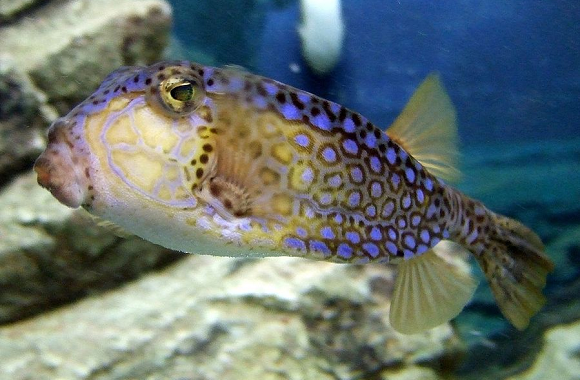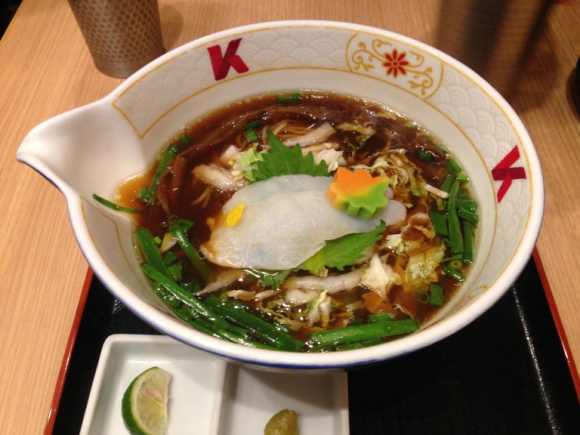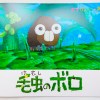
Probably should have set off a few warning bells.
Since Japan is an island nation, you’re never very far from the coast, which makes the country a great place to be an angler. Even if you’re a resident of a major city, like Nagoya, as long as you’ve got a couple free hours and a fishing rod, you can put together a quick seaside fishing excursion.
As an added bonus, making a meal out of whatever you catch is often a viable option, since so many Japanese side dishes pair well with fish, So after one Nagoya resident in his 60s recently pulled up a Ostraciidae boxfish (like the one pictured above), he figured it’d make a nice breakfast.
Rising early on the morning of November 29, the man cooked and ate the boxfish, likely thinking his day was off to a pretty good start. By the late afternoon, though, he wasn’t feeling so good, and by 4 p.m. the muscles throughout his entire body were in intense pain. He headed to the hospital for an examination, where doctors discovered the presence of palytoxin in his system.
English speakers might be forgiven for not knowing that Ostraciidae boxfish can secrete toxins through their skin as a defense mechanism. However, the danger should be a little more obvious in Japanese, since Ostraciidae boxfish are called “hako fugu,” which is a major warning sign because “fugu” is the Japanese word for the delicious, yet highly poisonous, blowfish found at gourmet Japanese restaurants.
▼ And in less expensive places like ramen shops and cans.
Making the whole thing even more startling is that the man says he knew the fish he’d caught was a hako fugu before he ate it. When asked by doctors if he was aware that hako fugu are poisonous, he said he “didn’t know much about it.”
Thought not as deadly as tetrodotoxin, the toxin found in takifugu (the most commonly eaten fugu in Japan), palytoxin still isn’t something you want to be consuming. Symptoms typically take 12 to 24 hours to manifest, and include severe muscular pain, spasms, and difficulty breathing. Extreme cases can even result in death. Thankfully the Nagoya fishing fan’s life is not in danger, though he remains in the hospital and is still recovering from the effects.
In response to the incident, the Nagoya municipal government has asked that amateur chefs refrain from preparing fugu, including hako fugu, that they have caught themselves, and to instead leave such food preparation work to licensed professionals.
We ate SoraNews24 would also like to take this opportunity to remind you to be careful about eating mushrooms you’ve harvested yourself in Japan as well, since certain varieties can cause painfully powerful diarrhea. Come to think of it, that incident also took place in Nagoya, so maybe if you happen to be hungry in the city, your best bet is just to go to one of its famous cafes instead.
Source: Asahi Shimbun Digital via Hachima Kiko
Top image: Wikipedia/Daiju Azuma
Insert image ©SoraNews24
Follow Casey on Twitter, where even though they can kill you, he’s got to admit that fugu are pretty cute.


 10-year-old Japanese girl is youngest person ever certified to prepare deadly poisonous blowfish
10-year-old Japanese girl is youngest person ever certified to prepare deadly poisonous blowfish You can now get fugu, Japan’s poisonous blowfish, for under a buck at revolving sushi restaurants
You can now get fugu, Japan’s poisonous blowfish, for under a buck at revolving sushi restaurants What happens if you feed pufferfish poison to pufferfish? Japanese scientists trying to find out
What happens if you feed pufferfish poison to pufferfish? Japanese scientists trying to find out We eat fugu pufferfish semen at a Japanese restaurant in Tokyo
We eat fugu pufferfish semen at a Japanese restaurant in Tokyo Students hospitalized after eating teacher’s homemade yogurt in Nagoya
Students hospitalized after eating teacher’s homemade yogurt in Nagoya Ghibli’s Kiki’s Delivery Service returns to theaters with first-ever IMAX screenings and remaster
Ghibli’s Kiki’s Delivery Service returns to theaters with first-ever IMAX screenings and remaster Development of Puyo Puyo puzzle game for use in nursing homes underway
Development of Puyo Puyo puzzle game for use in nursing homes underway Studio Ghibli releases giant Totoro plushies in Japan
Studio Ghibli releases giant Totoro plushies in Japan Boro the Caterpillar anime now showing at the Ghibli Museum in Tokyo 【SoraReview】
Boro the Caterpillar anime now showing at the Ghibli Museum in Tokyo 【SoraReview】 10 great quirky museums to beat the Japan rainy season blues
10 great quirky museums to beat the Japan rainy season blues Japanese convenience store chain’s new matcha sweets are heaven for green tea lovers
Japanese convenience store chain’s new matcha sweets are heaven for green tea lovers Cancelled your trip to Tokyo? Free papercraft download lets you build Akihabara in your own home
Cancelled your trip to Tokyo? Free papercraft download lets you build Akihabara in your own home Osaka establishes first designated smoking area in Dotonbori canal district to fight “overtourism”
Osaka establishes first designated smoking area in Dotonbori canal district to fight “overtourism” Saitama is home to the best strawberries in Japan that you’ve probably never even heard of
Saitama is home to the best strawberries in Japan that you’ve probably never even heard of Majority of Japanese women in survey regret marrying their husband, but that’s only half the story
Majority of Japanese women in survey regret marrying their husband, but that’s only half the story The 10 most annoying things foreign tourists do on Japanese trains, according to locals
The 10 most annoying things foreign tourists do on Japanese trains, according to locals Starbucks Japan releases new sakura goods and drinkware for cherry blossom season 2026
Starbucks Japan releases new sakura goods and drinkware for cherry blossom season 2026 Naruto and Converse team up for new line of shinobi sneakers[Photos]
Naruto and Converse team up for new line of shinobi sneakers[Photos] Is Sapporio’s Snow Festival awesome enough to be worth visiting even if you hate the snow? [Pics]
Is Sapporio’s Snow Festival awesome enough to be worth visiting even if you hate the snow? [Pics] Japan has trams that say “sorry” while they ride around town…but why?
Japan has trams that say “sorry” while they ride around town…but why? Tokyo Skytree turns pink for the cherry blossom season
Tokyo Skytree turns pink for the cherry blossom season Sakura Totoro is here to get spring started early with adorable pouches and plushies
Sakura Totoro is here to get spring started early with adorable pouches and plushies Poop is in full bloom at the Unko Museums for cherry blossom season
Poop is in full bloom at the Unko Museums for cherry blossom season Shibuya Station’s Hachiko Gate and Yamanote Line stairway locations change next month
Shibuya Station’s Hachiko Gate and Yamanote Line stairway locations change next month Japan’s new “Cunte” contact lenses aren’t pronounced like you’re probably thinking they are
Japan’s new “Cunte” contact lenses aren’t pronounced like you’re probably thinking they are Japan’s newest Shinkansen has no seats…or passengers [Video]
Japan’s newest Shinkansen has no seats…or passengers [Video] Foreigners accounting for over 80 percent of off-course skiers needing rescue in Japan’s Hokkaido
Foreigners accounting for over 80 percent of off-course skiers needing rescue in Japan’s Hokkaido Super-salty pizza sends six kids to the hospital in Japan, linguistics blamed
Super-salty pizza sends six kids to the hospital in Japan, linguistics blamed Starbucks Japan unveils new sakura Frappuccino for cherry blossom season 2026
Starbucks Japan unveils new sakura Frappuccino for cherry blossom season 2026 Foreign tourists in Japan will get free Shinkansen tickets to promote regional tourism
Foreign tourists in Japan will get free Shinkansen tickets to promote regional tourism Take a trip to Japan’s Dododo Land, the most irritating place on Earth
Take a trip to Japan’s Dododo Land, the most irritating place on Earth Is China’s don’t-go-to-Japan warning affecting the lines at a popular Tokyo gyukatsu restaurant?
Is China’s don’t-go-to-Japan warning affecting the lines at a popular Tokyo gyukatsu restaurant? Survey asks foreign tourists what bothered them in Japan, more than half gave same answer
Survey asks foreign tourists what bothered them in Japan, more than half gave same answer Japan’s human washing machines will go on sale to general public, demos to be held in Tokyo
Japan’s human washing machines will go on sale to general public, demos to be held in Tokyo Starbucks Japan releases new drinkware and goods for Valentine’s Day
Starbucks Japan releases new drinkware and goods for Valentine’s Day We deeply regret going into this tunnel on our walk in the mountains of Japan
We deeply regret going into this tunnel on our walk in the mountains of Japan Studio Ghibli releases Kodama forest spirits from Princess Mononoke to light up your home
Studio Ghibli releases Kodama forest spirits from Princess Mononoke to light up your home Major Japanese hotel chain says reservations via overseas booking sites may not be valid
Major Japanese hotel chain says reservations via overseas booking sites may not be valid Put sesame oil in your coffee? Japanese maker says it’s the best way to start your day【Taste test】
Put sesame oil in your coffee? Japanese maker says it’s the best way to start your day【Taste test】 No more using real katana for tourism activities, Japan’s National Police Agency says
No more using real katana for tourism activities, Japan’s National Police Agency says